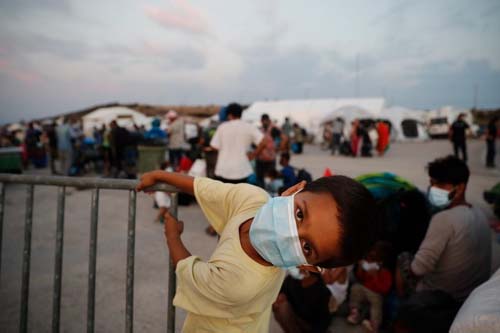
Global refugee crisis continues unabated amid pandemic
Mohamed Chebaro
The coronavirus disease (COVID-19) has led to the near freezing of human existence over the past 18 months, but has failed to push conflicting parties in our world to even take a break. A new UN report has painted another grim picture of the state of our planet, as states and societies everywhere seem unable to end conflicts, which are a key reason for civilians fleeing in search of new hope.
In its “Global Trends” report, released to coincide with World Refugee Day on June 20, the UN High Commissioner for Refugees (UNHCR) said that the number of people displaced due to conflict, persecution and human rights abuses has doubled in the past decade, rising to 82.4 million at the end of 2020.
The report rightly blames global leadership and leaderless states for failing to stop conflicts, which have claimed more victims, increased suffering and resulted in further displacement and migration.
As the world stumbles along in its efforts to contain an ever-elusive enemy — the pandemic — the global leadership looks incapable of seeing the bigger picture and long-term problems such as global warming, food insecurity, the refugee crisis, and economic uncertainties that are piling pressure on people everywhere, including rendering the vulnerable displaced and refugees even weaker. This global leadership, which is still busying itself with its immediate priority of staying in power, tends to shield its eyes from the world’s long-term problems, at the core of which is the issue of refugees.
In liberal democratic nations, electioneering tends to prevent leaders from actively working to resolve the discord that leads to violent conflict. In authoritarian nations, leaders tend to do everything to stay in power through narrow and egotistical approaches, even fanning the flames of conflict to inflate their worth at the negotiation table, at the expense of the dispossessed. Some have even unashamedly blackmailed other countries by weaponizing refugees, promising an influx in this or that direction if they are not offered material or geostrategic gains.
The UNHCR report highlighted how drawn-out crises like those in Syria, Afghanistan, Somalia and Yemen continue to contribute the largest number of refugees, while eruptions of violence in places like Ethiopia and Mozambique have led to surges in the numbers of those newly displaced.
Last year, an additional 11 million people were displaced in the aforementioned conflict-wracked countries, a slight increase on 2019. Syria still tops the list of countries producing refugees — more than 13.5 million Syrians are registered as displaced either inside or outside the country. More than two-thirds of the world’s refugees come from just five countries: Syria, Venezuela, Afghanistan, South Sudan and Myanmar.
New crises have also led to significant displacement, particularly the violence that has erupted in Ethiopia’s Tigray region, which has seen an exodus of tens of thousands toward Sudan. Meanwhile, hundreds of thousands of people escaped deadly violence in northern Mozambique and tens of thousands more were freshly displaced in Africa’s precarious Sahel region.
Turkey, the UNHCR report says, remained the host of the world’s largest refugee population, totaling 3.7 million, followed by Colombia with 1.7 million, Pakistan and Uganda with 1.4 million each, and Germany with 1.2 million.
There were only 3.2 million returning internally displaced persons last year, while returning refugees numbered only 251,000, marking a drop of 40 and 21 percent, respectively, on 2019.
In our uncertain, pandemic-stricken world, such figures and events might be ridiculed by some, as 200-plus nations and territories have shut their borders, canceled flights, interned whole provinces and locked down their populations and economies for weeks and months on end. This has come in the face of more than 180 million COVID-19 infections and nearly 4 million fatalities.
Early last year, rich and poor countries alike woke up to find their inadequate preparedness to deal with the spread of COVID-19, weakened emergency health provisions, starved public sector response capabilities, denial-stricken leadership, and the list could go on. But in each country we have also witnessed a rise in compassion within society to try and lessen the blow of the virus on the weak and vulnerable.
The newly rediscovered humanity in our midst should be capitalized on, with governments pushed to peacefully settle their differences, not only to deal with the refugee crisis but also to lessen the impact of the uncertainty that has been plaguing the lives of displaced people and others alike as a result of pandemic measures. The only hope is for our revived humanitarian approach to also influence the broken global governance system, which has been inflaming fears and flight at the expense of hope and fight, while presenting recipes for further conflicts to come, and hence more refugees.
The global leadership tends to shield its eyes from the world’s long-term problems, at the core of which is the issue of refugees.
World Refugee Day offered us all a chance to reflect on the uncertainty faced by those forced to flee their homes and possessions, and compare their situations to our 18 months of pandemic-induced uncertainty and its damaging impacts.
UNHCR Goodwill Ambassador Cate Blanchett was spot-on to say that this year’s World Refugee Day came during a time of “challenge and reflection.” She called on us all to seize the opportunity to think about how refugees have been living with uncertainty for decades, especially as we have all tasted uncertainty recently.
The Oscar-winning Australian actress said: “There is a kind of an opportunity… to think about how we have dealt with uncertainty and perhaps place ourselves in the shoes of mothers and fathers and doctors and lawyers who have been, through no fault of their own, displaced and have been living for upward of 18, 19 years in a similar state that we have been dealing with for 18 months.”
The writer is a British-Lebanese journalist with more than 25 years’ experience covering war, terrorism, defense, current affairs and diplomacy.
